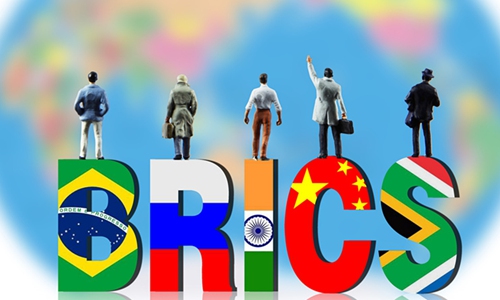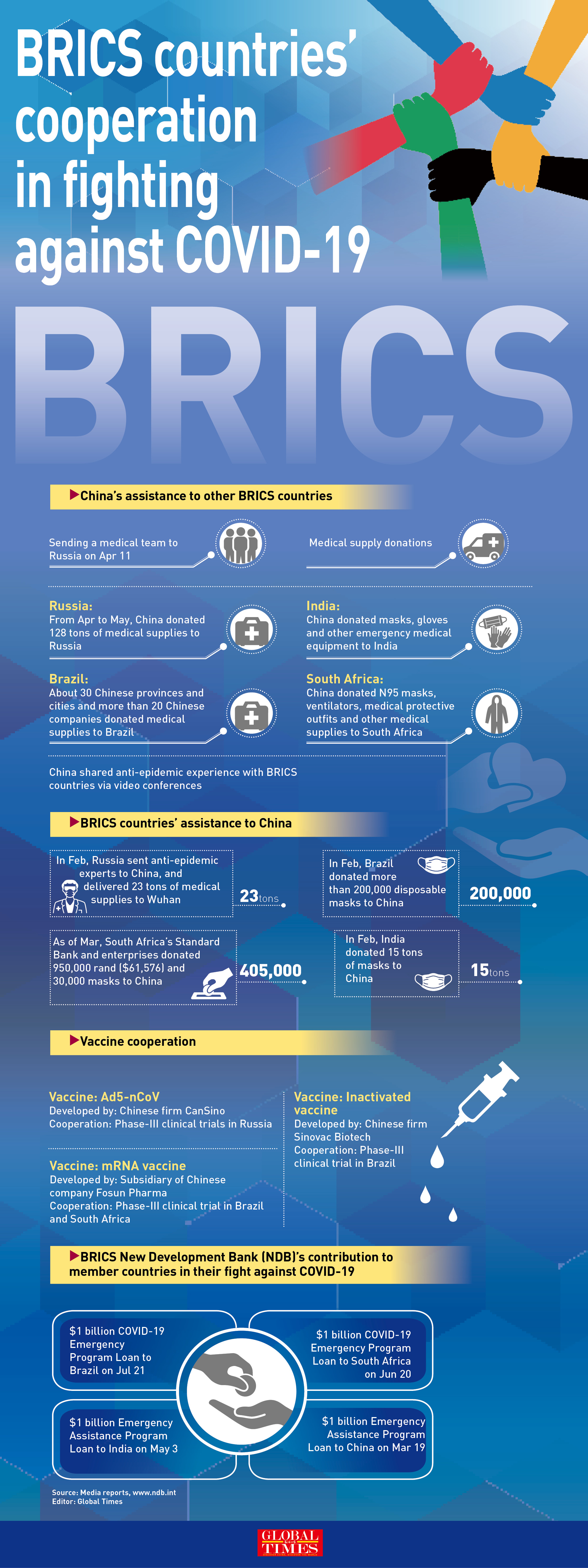BRICS summit opens 'busiest diplomatic season' for China
By Zhao Yusha and Ma Jingjing Source: Global Times Published: 2020/11/17 17:54:47
Role of Beijing, Asia-Pacific countries and emerging economies highlighted in leading world recovery from COVID-19 in slew of events: observers

BRICS Photo: VCG
On the heels of signing the Regional Comprehensive Economic Partnership (RCEP), the world's biggest free trade agreement, China is ushering in its busiest multilateral diplomatic season this year as its leading role is once again highlighted in a slew of international summits, including the BRICS summit, APEC Economic Leaders' Meeting and the G20 summit.
The start of the series of summits has cemented the leading role of China, Asia-Pacific countries and emerging markets in bolstering global economic growth, as well as upholding the momentum of multilateralism, just as the international community is confronting profound changes and growing uncertainties in the face of the COVID-19 pandemic and rising unilateralism, said Chinese observers.
Chinese President Xi Jinping will attend the 12th BRICS summit via video link on Tuesday at the invitation of Russian President Vladimir Putin, then followed by the 27th Asia-Pacific Economic Cooperation (APEC) Economic Leaders' Meeting and the 15th Group of 20 (G20) summit in the following two weeks in Beijing, Foreign Ministry spokesperson Hua Chunying announced on Thursday.
Fighting COVID-19, developing vaccine
The virtual summit of the 12th BRICS summit, which includes the five major emerging economies - Brazil, Russia, India, China and South Africa - is likely to focus on economic recovery and cooperation, which has been hampered by COVID-19, and enhanced collaboration on public health, experts predicted.
With certain members of the group still in the throes of COVID-19, fighting the pandemic will be high on the summit's agenda, Chen Fengying, a research fellow at the China Institutes of Contemporary International Relations, told the Global Times, noting that China and Russia have been relatively successful in battling the virus, so they can play the leading role in cooperation in this field, and share their experience with other members.
COVID-19 vaccine R&D is expected to be the highlight in discussions on fighting the virus, according to experts. "Luckily, some members have already conducted cooperation on vaccines, such as China and Russia, and China and Brazil," said Tao Lina, a Shanghai-based vaccine expert.
Chinese Ambassador to Russia Zhang Hanhui told the Guangming Daily on Monday that China hopes to work with Russia to effectively advance cooperation in vaccine research and development under the framework of the China-Russia Year of Scientific and Technological Innovation to jointly launch public health products, and protect the health of the two peoples.
Song Kui, president of the Contemporary China-Russia Regional Economy Research Institute, told the Global Times that at the BRICS summit, the member states will sign agreements related to vaccine cooperation that will contribute to regional and global efforts.
Once successfully developed, China is likely to share a vaccine primarily with BRICS members, making it a public good within this bloc, said Chen.
Chinese observers stressed that the lesson BRICS members can learn from COVID-19 is the need to expand communication on public health, build cooperative communication mechanisms and minister-level communication in the field of health.

Infographic: GT
Eyeing economic recoveryThe Russian embassy in Beijing said on Monday that the five leaders will announce an economic partnership strategy to 2025 that would set out priorities to develop cooperation in the areas of trade, investment, finance, the digital economy and innovation.
To inject much-needed energy into the bloc's cooperation, this year's BRICS summit is likely to achieve "more substantial progress", such as the signing of a cooperation blueprint for the next five years within the bloc, admitting new members to the New Development Bank, and building an innovation center for BRICS members, Wang Yiwei, director of the institute of international affairs at Renmin University of China, told the Global Times on Monday.
Wang said that innovation not only plays a key role in the future development of the world, but also strengthens BRICS members. "Members within the bloc are looking to create a new innovation mode that differentiates itself from the US capital-driven one which only benefits itself but exploiting developing countries. The innovation center and mode generated within the bloc are more suitable for developing states," said Wang.
Observers also shrugged off concerns that the border tension between China and India will overshadow cooperation within the five economies. "COVID-19 has dealt a heavy blow to India's economy, and the country is facing similar problems as other members within the bloc, namely, upgrading its industrial chain, easing economic restriction and promoting poverty alleviation. Also, India is looking at China to learn from its economic development experiences. So the rift between the two is unlikely to affect cooperation," said Wang.
Sergei Ryabkov, Russia's deputy foreign minister, also dismissed the suggestion that the China-India rift could affect the BRICS grouping, saying the bloc had "never thought of being a universal platform" for resolving bilateral disputes.
"For BRICS, it has its consolidating role in encouraging consensus … I am sure both India and China could benefit from participating in BRICS, and in the future they will find common ground … and work on an acceptable approach," Ryabkov said at a press briefing in Moscow.
Leading role
Wang has stressed China's role in leading economic growth within this bloc, saying that China is "well on its way" to emerging from the pandemic-induced economic crisis and will continue to be "the most important driver" for regional, as well as global economic growth.
On Sunday, China and 14 other economies signed the RCEP, the world's largest trade deal, to form a free trade zone in the Asia-Pacific region that will encompass a third of the global economy, in what Chinese officials and experts call a historic win for multilateralism that would help the regional and global economies cope with the COVID-19 pandemic and rising protectionism.
Chen also stressed that the BRICS summit will continue serving as a "bridge" between developed and developing nations, and help the bloc speak at the G20 with a united voice representing developing nations. "Cooperation and understanding between the two parts of the world is particularly important, as communication and cooperation have been paralyzed against the backdrop of COVID-19," said Chen.
According to the International Monetary Fund, China is the only BRICS member predicted to post positive GDP growth this year with a 1.9 percent expansion. That compares to an estimated 10.3 percent contraction for India, -8 percent for South Africa, -5.8 percent for Brazil and -4.2 percent for Russia.
Comprising five emerging economies, BRICS has become a symbol of an increasingly multi-polarized world amid unprecedented worldwide challenges, and the mechanism should be strengthened at a time when unilateralism and protectionism are on the rise, in order to provide new solutions for global governance and global economic recovery, experts noted.
Over the last two decades, BRICS has seen its combined proportion of global GDP grow in terms of purchasing power parity, rising from 18.8 percent in 2001 to 30.5 percent in 2019.
"These large developing economies can play a larger role when the global pandemic has paralyzed the global industrial chain in developed economies," Qian said, noting that under the guidance of China - the first major economy to resume economic and social activities - BRICS, with half of the world's population, will help maintain stability in the global industrial and supply chain while contributing to the fight against COVID-19.
Over the next week, the world's attention will be focused on these three multilateral meetings that will conclude a year plagued by coronavirus, and so will be fixed on the strength of China and emerging economies, which are being demonstrated amid a change in the world order, experts said.
Wang has stressed China's role in leading economic growth within this bloc, saying that China is "well on its way" to emerging from the pandemic-induced economic crisis and will continue to be "the most important driver" for regional, as well as global economic growth.
On Sunday, China and 14 other economies signed the RCEP, the world's largest trade deal, to form a free trade zone in the Asia-Pacific region that will encompass a third of the global economy, in what Chinese officials and experts call a historic win for multilateralism that would help the regional and global economies cope with the COVID-19 pandemic and rising protectionism.
Chen also stressed that the BRICS summit will continue serving as a "bridge" between developed and developing nations, and help the bloc speak at the G20 with a united voice representing developing nations. "Cooperation and understanding between the two parts of the world is particularly important, as communication and cooperation have been paralyzed against the backdrop of COVID-19," said Chen.
According to the International Monetary Fund, China is the only BRICS member predicted to post positive GDP growth this year with a 1.9 percent expansion. That compares to an estimated 10.3 percent contraction for India, -8 percent for South Africa, -5.8 percent for Brazil and -4.2 percent for Russia.
Comprising five emerging economies, BRICS has become a symbol of an increasingly multi-polarized world amid unprecedented worldwide challenges, and the mechanism should be strengthened at a time when unilateralism and protectionism are on the rise, in order to provide new solutions for global governance and global economic recovery, experts noted.
Over the last two decades, BRICS has seen its combined proportion of global GDP grow in terms of purchasing power parity, rising from 18.8 percent in 2001 to 30.5 percent in 2019.
"These large developing economies can play a larger role when the global pandemic has paralyzed the global industrial chain in developed economies," Qian said, noting that under the guidance of China - the first major economy to resume economic and social activities - BRICS, with half of the world's population, will help maintain stability in the global industrial and supply chain while contributing to the fight against COVID-19.
Over the next week, the world's attention will be focused on these three multilateral meetings that will conclude a year plagued by coronavirus, and so will be fixed on the strength of China and emerging economies, which are being demonstrated amid a change in the world order, experts said.
Posted in: POLITICS